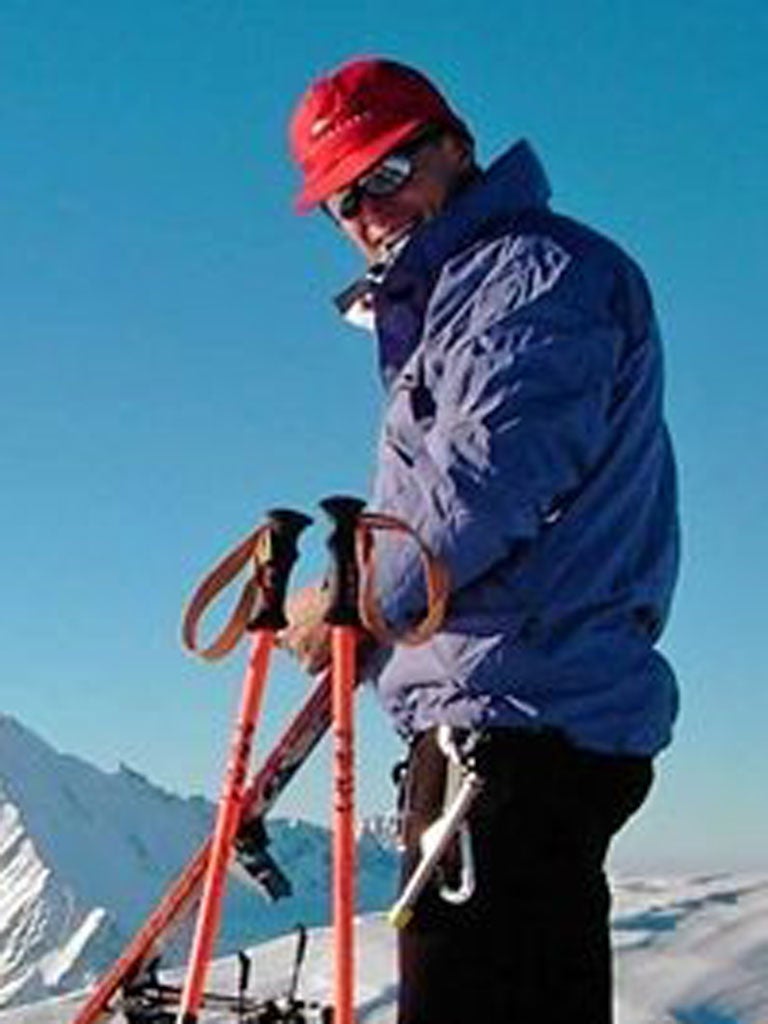Tributes paid to Alps avalanche victim Roger Payne

The mountaineering world has led tributes to one of the UK's most respected climbers after he was killed alongside two other Britons in a devastating avalanche.
Roger Payne, a mountain guide and former general secretary of the British Mountaineering Council, was among nine people who lost their lives after being hit by a massive wall of snow in the French Alps yesterday.
The victims were killed as they traversed Mont Maudit - translated as Cursed Mountain - in the Mont Blanc range near Chamonix.
Mr Payne, who was an avalanche instructor and well known across many branches of world climbing, was described as "one of the very best mountain guides" by fellow enthusiasts.
Dave Turnbull, the current chief executive of the BMC, said the mountaineering world was "shocked and saddened" by his tragic death.
"Roger was one of the UK's most enthusiastic and respected climbers, with a track record of Alpine and Himalayan mountaineering stretching back to the 1980s," he added.
Kenton Cool, a leading Alpine climber who knew Mr Payne, described him as "one of the very best mountain guides" and said he was "stunned into a silence" after hearing the news.
He told the BBC: "Roger was a very cautious, incredibly experienced guide. This is going to send shockwaves through certainly the British guiding fraternity and the French one - a very close-knit French community in Chamonix."
British mountaineer Sir Chris Bonington also paid tribute, saying the climber, who had taken part in more than 20 expeditions to the world's highest and most challenging peaks, was "a very special person."
Mr Payne, who was also a former president of the British Mountain Guide, was originally from Hammersmith in West London, but reportedly lived in Leysin, Switzerland, with New Zealand-born wife Julie-Ann Clyma, who is also an experienced mountaineer.
In a distinguished list of achievements, the couple became the first to make it to the summit of Mount Grovesnor in China in 2003.
Two other Britons - including climber Dave Compton - were reported missing following the avalanche, but were confirmed safe and well after presenting themselves to police in Chamonix yesterday evening.
All those believed to have been missing have been accounted for, but police are due continue searching the area this morning.
As well as Mr Payne and the two other Britons who are yet to be named, the avalanche claimed the lives of two Spaniards, three Germans and one Swiss, according to the Prefecture de la Haute-Savoie.
They all were part of a 28-strong group which left a climbing hut to attempt the route, described by local guides the second most popular to the top of Mont Blanc, following a 1am breakfast.
The group included independent climbers and others supervised by professional mountaineering guides.
At around 5.20am, French authorities received reports that a "slab" avalanche had hit several groups of mountaineers who were roped together on the northern face of Mont Maudit at 13,123ft (4,000m).
Several dozen gendarmes and other rescuers along with two helicopters were sent to the scene to pull the dead and injured from the mountain. Nine people were taken to hospital in Sallanches with minor injuries.
The prefecture said some climbers had crossed the path of the avalanche before it hit and others were able to turn back.
Describing the sequence of events, it said block of ice 16in (40cm) thick broke off and slid down the slope, creating a mass of snow that was 6ft (2m) deep and 328ft (100m) long.
Regional authorities believe the avalanche may have been triggered by a climber accidentally snapping off a slab of ice on the mountain.
Mr Compton, of Ellesmere Port, and his climbing mate were reported missing along with two Spaniards following the tragedy.
He later revealed he was half an hour behind the group caught up in the avalanche and had turned back to Chamonix after seeing the aftermath.
The 41-year-old said he did not realise there was a search party out for him or the scale of what had happened until he saw the news.
Foreign Secretary William Hague sent his condolences to the friends and families of those affected, saying he was "very saddened" by the tragedy.
The Mont Blanc massif is a popular area for climbers, hikers and tourists but a dangerous one, with dozens dying on it each year.
Climbers had been warned to be careful earlier this summer because of an unusually snowy spring, while recent storms had apparently left dangerous overhanging conditions on some of the popular climbing routes around Mont Blanc, the highest mountain in Western Europe.
Join our commenting forum
Join thought-provoking conversations, follow other Independent readers and see their replies
Comments
Bookmark popover
Removed from bookmarks